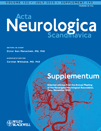Moderate wine consumption is associated with better cognitive test results: a 7 year follow up of 5033 subjects in the Tromsø Study
Conflicts of interest: none.
Abstract
Arntzen KA, Schirmer H, Wilsgaard T, Mathiesen EB. Moderate wine consumption is associated with better cognitive test results: a 7 year follow up of 5033 subjects in the Tromsø Study. Acta Neurol Scand: 2010: 122 (Suppl. 190): 23–29. © 2010 John Wiley & Sons A/S.
Background – The impact of moderate alcohol consumption on cognitive function and dementia is unclear. We examined the relationship between consumption of different alcoholic beverages and cognitive function in a large population-based study.
Methods – Subjects were 5033 stroke-free men and women who participated in a longitudinal population-based study in Tromsø, Norway. Alcohol consumption and other cardiovascular risk factors were measured at baseline and cognitive function was assessed after 7 years follow up with verbal memory test, digit–symbol coding test and tapping test.
Results – Moderate wine consumption was independently associated with better performance on all cognitive tests in both men and women. There was no consistent association between consumption of beer and spirits and cognitive test results. Alcohol abstention was associated with lower cognitive performance in women.
Conclusions – Light-to-moderate wine consumption was associated with better performance on cognitive tests after 7 years follow up.




